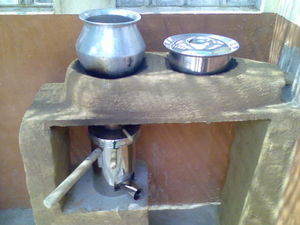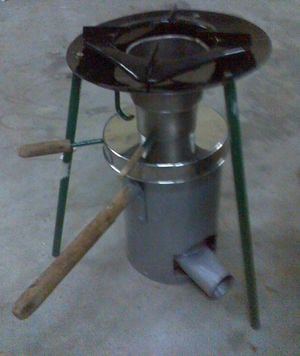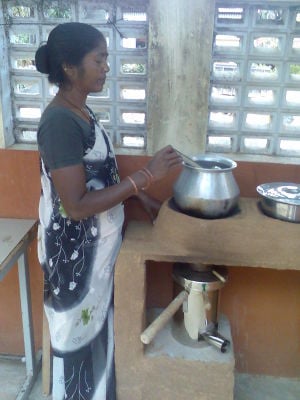
The TLUD stove is a simple wood Stove that is green and of low carbon emission. It is a project of SERVALS Automation Pvt LTD[1] This project is the winner of the Sankalp 2010 award in the Clean Energy Sector – Established Enterprise Category.
Highlights[edit | edit source]
- The key focus is to design an integrated cooking energy solution for the wood stove market that addresses the "front-end" and the "back-end".
- TLUD stands for Top Lit Up Draft. This is different from most of the ordinary cook stoves which are Bottom Lit Up Draft. There is a lot of interest in TLUD technology around the world since this saves around 75 % fuel material compared to a traditional 3 stone fire wood stove.
- While the TLUD gasifier technology is not new, SAPL's TLUD Stove's claim is that it represents a higher order of fuel efficiency, user friendliness, safety and newer user application.
- Recognized as a "carbon neutral" initiative; In fact would be "carbon negative" when the charcoal is dumped back into the soil. Read more...
- Has the potential to create a series of economic activities around fuel collection and distribution. Read More...
- Has a line-up of innovations in the pipeline. Read More
- We have also applied for International Product Validation and Verification from Aprevocho Research Center, USA and Bio-char research project,Australia

Key Product Advantages[edit | edit source]
- The major advantage lies in its energy efficiency. It has been tested to have an efficiency of 39% Vs the 9% of the 3 stone stove.
- A second advantage with TLUD technology is that it can accept a lot of waste materials as fuel like twigs, coconut shells, certain husks, dry grass, etc. Some of these fuels are also available at NIL cost in specific instances.
- A third advantage is that tree felling is not necessary for fuel, since residues as mentioned above is enough.
- A fourth advantage is that the entire process is carbon-neutral if the resultant charcoal is also burned. In case this charcoal is taken out and used as a soil conditioner, the entire process becomes carbon-negative. ie. practically, carbon is removed from the atmosphere and deposited in the soil. Hence TLUD technology is extremely environment-friendly.
The Process[edit | edit source]

The canister is filled with the fuel material. A small quantity of starter material is put on top of this fuel bed and set on fire. Primary air for combustion comes from below through the fuel bed. The heat from the fire pyrolysis the biomass immediately below to form pyrolysis gases. These gases move up and get combusted with the pre-heated secondary air that is fed from around. Once the pyrolysis is over, a small quantity of charcoal is left behind at the bottom of the canister. This charcoal is generally transferred to a metallic or earthen closed container where the fire gets put out in the absence of air. This charcoal can be used later for various purposes.
The present design used by Servals has been given by Dr. Paul S Anderson of US. SAPL is already offering the stainless steel version commercially. The institutional version and the ceramic version are due to be launched by the end of the year.
As it looks at present, TLUD Gasifier Stove technology holds tremendous potential in relation to greener environment and low carbon initiatives.
Read about our patented energy saving kerosene burners and[stove|kerosene stove] too.
Contact us for more details
External links[edit | edit source]
- Top Lit Updraft Stove - Similar model made from a paint can and wood bits